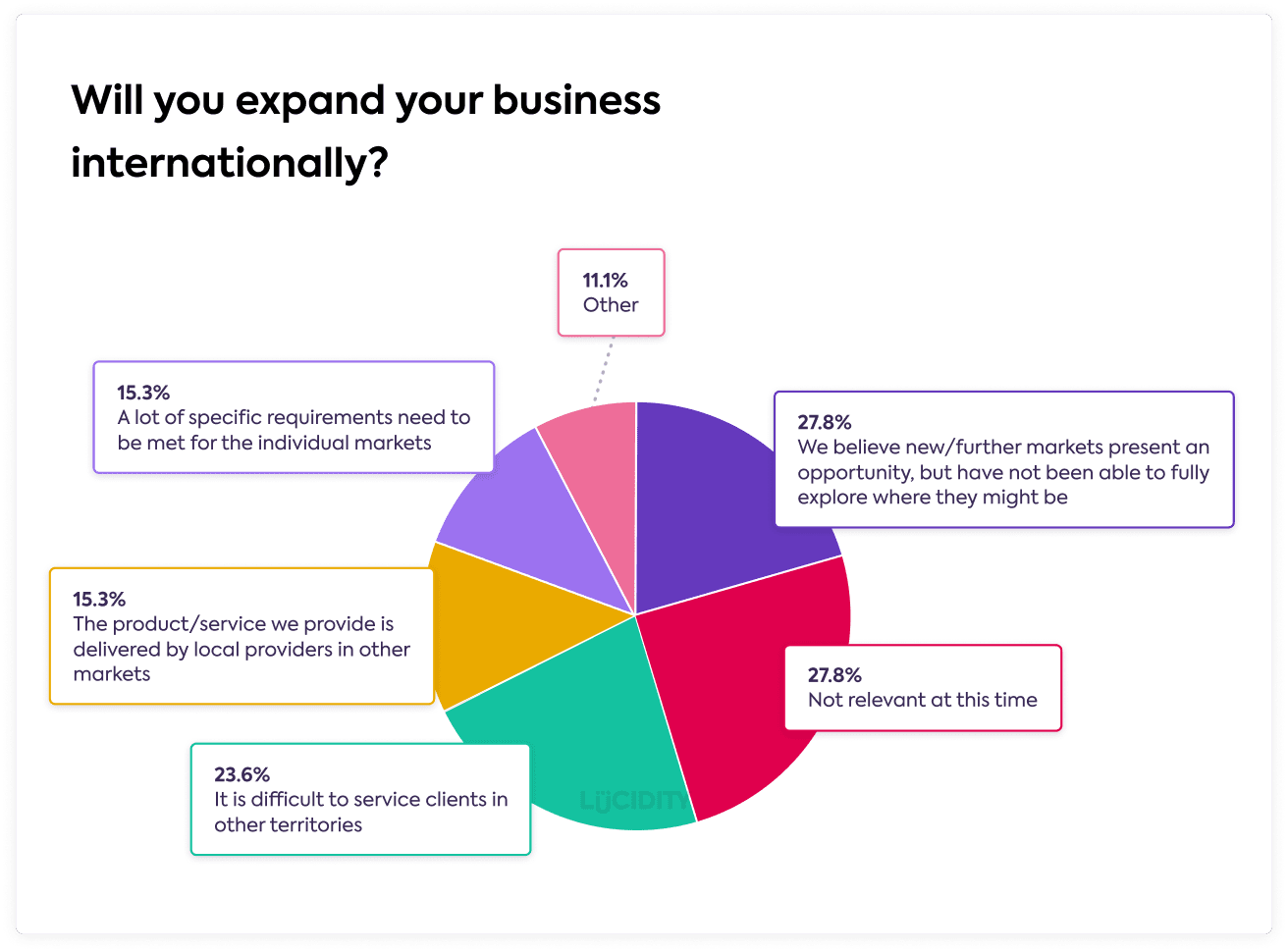Overseas expansion is in a great growth opportunity for many companies, yet is equally fraught with risk, complication and a graveyard of businesses that have tried unsuccessfully to do it.
In this article we look at how several hundred companies are considering international expansion.
Why consider international expansion?
Different markets can have very different competitive pressures – from mergers and acquisitions reducing the number of players, to pricing pressure caused by multiple options. We asked business leaders to best describe the competitive landscape of their marketplace.
For 32% of respondents, prices being driven down best characterised the conditions in their marketplace. The most common competitive pressure felt by the companies taking part in our research was the pressure caused by price reduction on the market.
As stated, for 32% of respondents, prices being driven down best characterised the conditions in their marketplace. The second most common competitive pressure, felt by 24% of the company, was similar solutions in the market becoming more sophisticated.
Interestingly, of everyone facing this competitive challenge, 70% also said they lacked the time and resource to focus on innovation.
Looking at your own country
When faced with a challenging competitive landscape it’s important to be clear on your competitive positioning – what exactly are you competing on and what is your pricing strategy?
It may be worth revisiting a simple tool like Porter’s Generic Strategies to help firm-up your thinking here.
A particularly powerful competitive approach is to understand the resources and capabilities within your business that are valuable and uniquely rare to you – and then organise your business around those to capitalise on that value. The VRIO framework is a helpful tool to give this insight.
Looking at other countries
If innovation is off the agenda, transferring your existing product to new markets is a very commonly used way to grow a business. It’s fair to say that geographic expansion is one of the most effective ways to grow your business.
It can be risky, yet it comes with huge rewards. Let’s take a look at what companies said regarding this opportunity…
A real mix of concerns ranging from the logistics of servicing different markets through to the local competitors.
For nearly 30% of companies, expanding internationally isn’t even a consideration right now. Of the 30% of people who responded that geographic expansion was not relevant at this time, 40% of those business leaders also stated that they were in a market in which prices were being driven down.
Different geographies with different economic considerations may be less price- sensitive and provide a solution to this competitive pressure.
A quarter of all those who said they were not considering geographic expansion also stated that there were alternatives to their products or services that customers preferred. In this case, exploring geographic markets where competitors are not active in may be worthwhile.
A missed opportunity?
Not taking advantage of geographic expansion represents something of a missed opportunity.
There are two approaches in particular that might be worth pursuing.
Firstly, find local organizations designed to help you. For example, the US has the European American Chamber of Commerce, which is a network designed to help you busineses grow between Europe and the US. If you’re in the UK then working with the Department for International Trade (DIT). Whatever their failings, they do sometimes come through with the goods and in recent times the success of Grenade, the sports nutrition company, is testament to their efforts. Working with DIT, Grenade’s overseas sales now account for 20% of annual turnover and online sales are up by 294% which underlines the opportunities available to UK businesses in new markets.
There are lots of these groups out there, formal and more informal, ready to help you grow.
The second avenue to consider is a partnership approach. Having partners (or distributors) in selected countries can considerably help increase turnover at little cost. Whilst it is important to commit effort and resource into any partnership arrangement, getting the right partner can significantly increase the chances of success. One UK firm following this approach has recently increased revenues by over 33%.
Helpful International Expansion Frameworks
If, like nearly 30% of our company leaders, you recognise that geographic expansion does represent a growth opportunity for you, then we’d recommend a number of tools to help assess each new geographic market you are considering and understand its challenges and opportunities.
Firstly, a PESTLE analysis is a commonly used framework you will no doubt be familiar with. A localised PESTLE, examining a specific market is a useful exercise to help you see the factors that will impact your business in those regions.
Secondly, the CAGE Distance framework tool helps you capture essential information when entering a new market and highlights what you will need to do in any new geographic market.
Combining these tools with a Porter’s Five Forces analysis of your newly considered market will give you a thorough understanding of the opportunities and risks to drive success.













